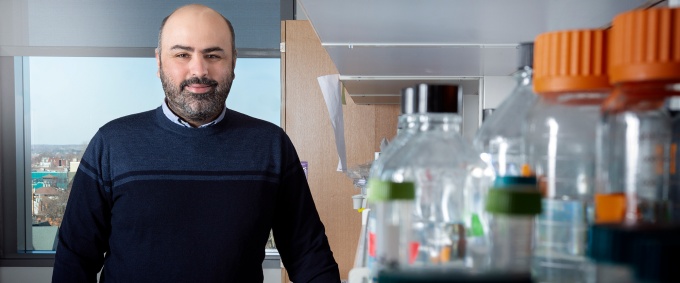Virology

With his broad background in the field of virology and in-depth experience studying host-pathogen interactions, faculty member Spyridon Stavrou, PhD, is uniquely qualified to teach trainees about retroviral infections.
We study a wide variety of viruses, including papillomaviruses, human immunodeficiency virus (HIV) and human cytomegalovirus (HCMV). We focus on basic molecular mechanisms. In the long term, we aim to understand viral infection and reactivation, prevent viral infection and develop anti-viral therapies.
Understanding Disease Processes; Seeking Therapies
We study molecular DNA and RNA synthesis, nucleic acid-protein interactions and gene regulation. We also work to characterize virulence determinants and discover therapeutic targets.
A major focus is on DNA replication mechanisms, including protein-protein interactions, and DNA damage response pathways, especially in the small human DNA viruses — polyoma- and cancer-inducing papilloma (HPV) viruses.
We also study RNA structural switches involved in the replication of RNA viruses and subviral RNA pathogens. Our goal is to develop a replication system to screen for inhibitors to RNA replication and develop RNA vectors with novel functions.
Our researchers are exploring the pathogenesis of the human cytomegalovirus (HCMV), the leading cause of birth defects in the United States. We are studying viral latency and how it transitions to a lytic infection. We are focusing on the role of viral G-protein-coupled receptors (vGPCRs) in these processes.
We also are studying structural proteins in the human immunodeficiency virus (HIV). Our goals are to understand how the virus enters cellular membranes and to develop inhibitors of HIV entry. We also study co-infection of HIV with the pathogenic fungus Cryptococcus neoformans in human macrophages.
Another focus is the epidemiology of tick-bourne hemorrhagic fever viruses, such as hantaviruses.
Research News
Learn More
Department Faculty

Saikat Boliar, PhD
Assistant Professor

Amy Jacobs, PhD
Research Associate Professor

Thomas Melendy, PhD
Associate Professor of Microbiology & Immunology, and Biochemistry

Spyridon Stavrou, PhD
Associate Professor





